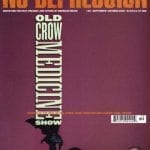Pete Droge – Busy being born
In the beginning, for aspiring young singer-songwriters, it’s generally all about writing a few tunes, rehearsing them with a band, getting some gigs, booking some studio time…and, if you’re lucky, there’s a record deal, followed by a long stretch of touring.
What comes of all that is a crap shoot, and mostly not under your control, particularly given the modern minefield of radio play. But there are other ways to get your music heard. Movies, for instance.
It worked for Pete Droge. As a mid-twentysomething upstart in Seattle sporting a bag full of catchy, rootsy original material at the peak of the grunge takeover, Droge easily could have been lost in the shuffle when his 1994 debut Necktie Second came out on American Recordings — if not for the prime placement of his song “If You Don’t Love Me, I’ll Kill Myself” in Jim Carrey’s box-office blockbuster, Dumb And Dumber.
The movie may have lived down to its title, but the millions who went to see it heard Droge’s tune in a prime spot during the film, and again over the closing credits. Lyrically clever and driven by an instantly memorable melody, “If You Don’t Love Me” gave Droge the kind of career boost out of the gate that few artists are fortunate enough to receive.
“I remember specifically when I was told it was going to be in there, and I was like, oh, that’s cool, great,” Droge shrugs, recounting his relative indifference at the time. “I had no idea. And it’s like, ‘Oh, they’ve got a $20 million advertising budget.’ I’m like, oh, that’s cool, is that a lot? ‘Jim Carrey, he’s a big star, he’s gonna be huge.’ I’m like, oh, OK.
“I really had no idea of the staying power of a movie like that, and what that meant. You know, the song’s played again on the end titles; and then, the next thing that everybody wants is to be the lead single from the soundtrack album. To even be on the soundtrack album, everybody wants that, and then to be the single from the soundtrack — all that happened. I had no idea that these were the things that everybody was fighting tooth and nail to get.”
If all Droge gained from the experience was a music-biz lesson, it would have been plenty worthwhile — but it turns out that movies have affected the craft of his art as well. His increasing awareness of the relationship between music and film (he followed that first break with the title song in Matt Dillon’s 1996 film Beautiful Girls, and he had a brief cameo in Cameron Crowe’s Almost Famous) eventually led him to the realm of creating musical scores for independent films.
Droge’s scores adorned the 2002 indie Tattoo, A Love Story and 2003’s Catching Out. The exercise of writing instrumental passages and interludes, rather than lyric-based songs, helped to transform his own music. The impact is evident on Under The Waves, Droge’s fifth solo album, released August 15 on his own Puzzle Tree Records.
“I think it changed the way that I approach melody,” Droge offers. “The record was really sort of influenced by scoring, in that I wanted the music beds to hold up as instrumental tracks, and arrangement-wise to stay out of the way of the vocal — which is what you do with scoring.
“You can’t put a bunch of stuff in the midrange area, because people are talking. If you put all the instruments in the same range where speech recognition is, you end up with a score that they’re just gonna turn way down. So you arrange things to stay out of the way of the dialogue….That idea applied to songwriting was exciting, because you end up with tracks where there’s immense space for the vocal to sit on top of the mix.”
He points to the new album’s “Butterfly” as a prime example, and it’s clear to hear what he’s talking about. Where Droge’s 1990s major-label work tended toward sonically dense and layered arrangements, the elegant guitar opening to “Butterfly” floats in crisp and clean like a cool breeze blowing across the northern lights. The elegant, bittersweet lyrics — “Don’t be afraid to leave the ground/When you land you won’t make a sound” — glide above the music as gracefully as the song’s namesake.




